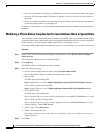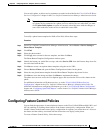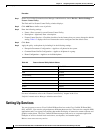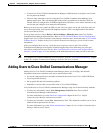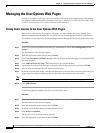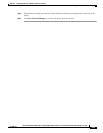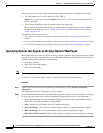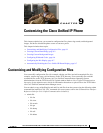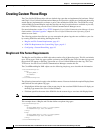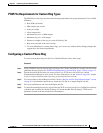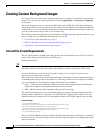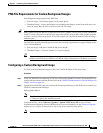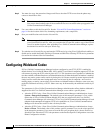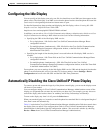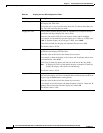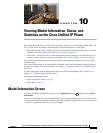
9-2
Cisco Unified IP Phone 8961, 9951, and 9971 Administration Guide for Cisco Unified Communications Manager 8.5 (SIP)
OL-20861-01
Chapter 9 Customizing the Cisco Unified IP Phone
Creating Custom Phone Rings
Creating Custom Phone Rings
The Cisco Unified IP Phone ships with two default ring types that are implemented in hardware: Chirp1
and Chirp2. Cisco Unified Communications Manager also provides a default set of additional phone ring
sounds that are implemented in software as pulse code modulation (PCM) files. The PCM files, along
with an XML file (named Ringlist.xml) that describes the ring list options that are available at your site,
exist in the TFTP directory on each Cisco Unified Communications Manager server.
For more information, see the “Cisco TFTP” chapter in Cisco Unified Communications Manager System
Guide and the “Software Upgrades” chapter in Cisco Unified Communications Operating System
Administration Guide.
The following sections describe how you can customize the phone rings that are available at your site
by creating PCM files and editing the Ringlist.xml file:
• Ringlist.xml File Format Requirements, page 9-2
• PCM File Requirements for Custom Ring Types, page 9-3
• Configuring a Custom Phone Ring, page 9-3
Ringlist.xml File Format Requirements
The Ringlist.xml file defines an XML object that contains a list of phone ring types. This file can include
up to 50 ring types. Each ring type contains a pointer to the PCM file that is used for that ring type and
the text that will appear on the Ring Type menu on a Cisco Unified IP Phone for that ring. The Cisco
TFTP server for each Cisco Unified Communications Manager contains this file.
The CiscoIPPhoneRinglist XML object uses the following simple tag set to describe the information:
<CiscoIPPhoneRingList>
<Ring>
<DisplayName/>
<FileName/>
</Ring>
</CiscoIPPhoneRingList>
The following characteristics apply to the definition names. You must include the required DisplayName
and FileName for each phone ring type.
• DisplayName defines the name of the custom ring for the associated PCM file that will display on
the Ring Type menu of the Cisco Unified IP Phone.
• FileName specifies the name of the PCM file for the custom ring to associate with DisplayName.
Note The DisplayName and FileName fields must not exceed 25 characters.
This example shows a Ringlist.xml file that defines two phone ring types:
<CiscoIPPhoneRingList>
<Ring>
<DisplayName>Analog Synth 1</DisplayName>
<FileName>Analog1.raw</FileName>
</Ring>
<Ring>
<DisplayName>Analog Synth 2</DisplayName>
<FileName>Analog2.raw</FileName>
</Ring>
</CiscoIPPhoneRingList>



